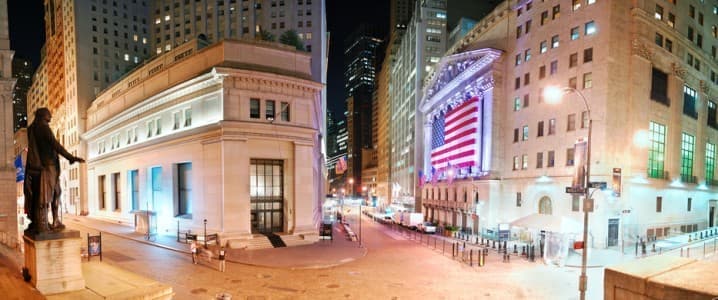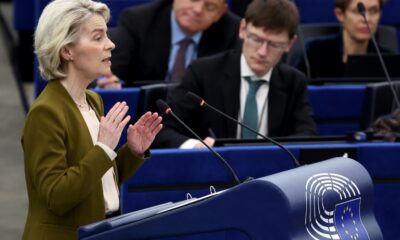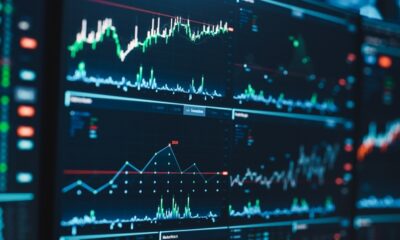Business
Markets Navigate Uncertainty as September Begins with Mixed Signals

US equity futures showed little movement on September 4, with cash markets closed for the Labor Day holiday. This stability comes after a significant selloff in technology stocks on Friday, largely due to renewed concerns surrounding Nvidia. As markets enter September, they face critical tests, including jobs reports, inflation data, and the Federal Reserve’s forthcoming interest rate decision within the next three weeks. Historically, September has been challenging for markets, often marked by sharp selloffs.
The S&P 500 futures remained unchanged, while Nasdaq futures rose by 0.1%. This month is particularly crucial; the stock market rally, which has reached all-time highs, will be tested by a series of economic indicators. Peter Sidorov, an economist with Deutsche Bank AG, noted that the threshold to prevent a rate cut on September 17 appears high. “Markets are expecting an amount of easing that since the 1980s has only occurred around recessions,” he stated, highlighting that futures are pricing in over 140 basis points of easing by the end of 2026.
In Europe, the Stoxx 600 index edged up by 0.1%. Shares in defense companies such as BAE Systems and Rheinmetall AG were among the strongest performers following reports that Europe is preparing for potential post-conflict deployments in Ukraine. Additionally, Novo Nordisk drove a rally in healthcare stocks after positive results from a cardiovascular study regarding its drug, Wegovy.
As European equities show signs of resilience, top Wall Street strategists suggest that a stronger economic outlook could help the region escape its recent narrow trading range. Goldman Sachs predicts that the Stoxx 600 will climb by approximately 2% to 560 by the end of the year, driven by improving growth prospects and attractive valuations. JPMorgan strategist Mislav Matejka characterized the recent loss of momentum as a “healthy” development.
Asian markets presented a mixed picture. While shares of Alibaba Group surged by 19% following impressive revenue growth in AI-related products, many other tech stocks faced declines. In Indonesia, political instability led to a sharp drop in stock prices, with President Prabowo Subianto canceling a trip to China amid unrest over living costs.
In the bond market, stress was evident as yields on Indonesia’s 10-year government notes rose to their highest point in almost three weeks. The Bloomberg Dollar Spot Index fell by 0.1%, with the Swedish krona and Norwegian krone leading gains against the US dollar, each rising by 0.6%.
The US cash bond markets remained closed due to the holiday, while European bonds exhibited broad weakness. Tensions in France are mounting ahead of a confidence vote that could destabilize the government. The French-German 10-year spread, a critical measure of risk, remained stable at 78 basis points, having closed at 82 on August 27, the highest level since January.
In commodities, silver prices surpassed $40 an ounce for the first time since 2011, while gold approached an all-time high amid growing optimism regarding potential interest rate cuts by the Federal Reserve. WTI crude futures increased by 1% to around $64.70 a barrel.
The upcoming US payrolls report on September 8 is expected to be a focal point for investors, with economists forecasting a modest increase in both headline and private payrolls. The unemployment rate is projected to hold steady at 4.2%, with a possibility it may round down to 4.1%. Given the current market sentiment, a substantial payrolls outperformance would be necessary to dissuade expectations of a September rate cut.
Before the payrolls report, labor market indicators, including the JOLTS survey and the ADP report, will be released, adding to the data landscape that Federal Reserve officials are closely monitoring. Governor Christopher Waller recently suggested that a weak payroll print could bring a significant cut into play, indicating a cautious stance among Fed officials regarding the labor market.
As the month progresses, geopolitical tensions will also influence market dynamics. The Shanghai Cooperation Organisation summit is currently underway in China, where President Xi Jinping met with India’s Prime Minister Narendra Modi. Both leaders pledged to foster cooperation amid heightened tariff pressures from the United States.
In summary, as September unfolds, global markets are navigating a landscape filled with uncertainty and potential volatility. Investors will be closely watching economic indicators and geopolitical developments to assess their impact on market performance in the weeks ahead.
-

 Politics4 weeks ago
Politics4 weeks agoSecwepemc First Nation Seeks Aboriginal Title Over Kamloops Area
-

 World5 months ago
World5 months agoScientists Unearth Ancient Antarctic Ice to Unlock Climate Secrets
-

 Entertainment5 months ago
Entertainment5 months agoTrump and McCormick to Announce $70 Billion Energy Investments
-

 Science5 months ago
Science5 months agoFour Astronauts Return to Earth After International Space Station Mission
-

 Lifestyle5 months ago
Lifestyle5 months agoTransLink Launches Food Truck Program to Boost Revenue in Vancouver
-

 Technology3 months ago
Technology3 months agoApple Notes Enhances Functionality with Markdown Support in macOS 26
-

 Lifestyle3 months ago
Lifestyle3 months agoManitoba’s Burger Champion Shines Again Amid Dining Innovations
-

 Top Stories2 months ago
Top Stories2 months agoUrgent Update: Fatal Crash on Highway 99 Claims Life of Pitt Meadows Man
-

 Politics4 months ago
Politics4 months agoUkrainian Tennis Star Elina Svitolina Faces Death Threats Online
-

 Sports5 months ago
Sports5 months agoSearch Underway for Missing Hunter Amid Hokkaido Bear Emergency
-

 Politics5 months ago
Politics5 months agoCarney Engages First Nations Leaders at Development Law Summit
-

 Technology5 months ago
Technology5 months agoFrosthaven Launches Early Access on July 31, 2025





















